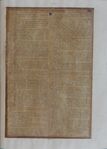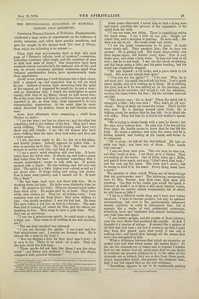The Psychological Influence of Material Objects Upon Sensitives
Professor William Denton, of Wellesley, Massachusetts, conducted a large series of experiments on the influence of shells, minerals, and relics upon psychic sensitives, and gave the results in his unique book The Soul of Things, from which the following is an extract:—
What light does psychometry shed on that still dark page of “Nature’s infinite book of mystery”—conscious, individual existence after death, and the condition of man in that next state of being? Our researches have been confined almost exclusively to the material side of life; and yet, on several occasions, spiritual existences, apart from ordinary psychometric forms, have spontaneously made their appearance.
About seven years ago I took Sherman into a dark closet, held a magnet up, and requested him to tell me what he saw. Instead of seeing light streaming from the poles of the magnet, as I supposed he would do, he saw a man; and, on describing him, I found the description to agree exactly with that of my father, whom he had never seen. He at the same time said that he could hear him speak; and repeated to me, as from him, what appeared to be very characteristic expressions. At the same time he accurately described my mother, whom he had likewise never seen.
Some days afterward, when examining a shabti from Thebes, he said—
“I see two men: one has no shoes on; and the other has something tied to the bottom of his feet. They don’t wear much clothing. They are homely-looking, and have very short and stiff beards. I see two old women who have more clothing than the men: they look sober, and they are a sober people.
“I see one man ready to die: he lies on a flat place, and faintly groans. Nobody appears to notice him. A man is running up to him. He is dead. The man commences to mourn over him, and kind of pray.
“I see a man’s spirit standing still over him. It looks better than the dying man. It stands up, and looks a great deal better than the man. It mumbles something that cannot understand; seems to talk with me. It points upward with a finger. He was walking, and fell over and died. The spirit is a little higher now—about as tall as am above him. It keeps rising and rising, but slowly, Now it darts away quickly, and I cannot see it. It went like a flash.*
“He has come back now, and three with him. He is showing them his body. He talks more distinctly than he did. He points to his body. They are dressed much better than when alive. He seems glad he is dead. They have white, thin clothes on. They are all talking away. I see numbers now not far from there: they seem talking to him. One slowly vanished: I saw his feet last. He went like snow before a hot fire, or lead in a furnace. The man that died is looking all round for him, and the others are laughing at him. They seem to have a jolly time. Why, they can go anywhere.
“I can see a mischievous spirit; he could make a hand, a large one. They seem to be looking at me and touching me. †
“The one that vanished has returned.
“I can see through the spirits. I can touch and feel that mischievous one. I cannot see through him. He is almost like a man in the body. ‡
“Men are digging a hole for that dead man’s body: it is easy to dig. There is no wind: all is still. They dig the hole about five feet deep.
“These spirits did not look like those I saw the other night” (my father and mother): “they look like stones compared with polished diamonds.”
Some years afterward, I asked him to find a dying man and watch carefully the process of the separation of the spirit from the body.
“I can see some one dying. There is something eating his heart away. I see a hole on one side. People are round him, and a minister is praying. He feels well. He does not stir at all. His heart beats very slowly.
“I see his heart commencing to be green. It beats more slowly still. They question him; but he does not answer. He is getting cold. His heart stops awhile, and then begins again, but fainter every time. Now it only beats once, and stops a long while. It does not beat at all now; but he is not dead. I can see the blood circulating, and his lungs going a little, and his pulse beating; but his heart has completely stopped.
“He was injured: a rib broke, and a piece stuck in his heart. His eyes are almost half open.”
(“Can you see his spirit?”) “I do now. Why, he is not dead yet! his spirit has not left his body. I see a great many spirits, and he is looking up to them. He is rubbing his eyes, just as if he was getting up in the morning, and laughing at the minister, and trying to call his attention, moving his hand before his face; but the minister does not see him.
“The doctor says, ‘He is dead.’ When the spirit left it struggled a little: why was that? They don’t go off anywhere. Many of them are round the house. Don’t he feel nice now. He is dancing around quite lively. He is talking about his mother that he has left: he is afraid she will suffer. They tell him he is tied to his mother’s apron strings.
“He is trying to shake hands with a man he knows; but the man never notices him. He asks him if he has got the floor done. He hardly seems to know that he has left the body. He meets a number, and tries the same, and he is feeling himself, and looking at his hands, and seems to be surprised.
“He is clean: he left all the dirt behind. He has no nails nor hair; nor have any of them. Their heads look curious.**
“I can see them turn over. This one says he dare not, and they laugh at him. I see them go to a library. They are looking at the books. One of them takes up a Bible, and puts it down again, and says, ‘I don’t want that book;’ and the rest say the same. The book don’t move; but he seems to hold it in his hand. Every thing must have a spirit.”
The question is often asked, Where are all these things that the psychometer sees? The following, unexpectedly seen by Mrs. Denton, may shed some light upon this question. Can this be the realm into which the spirit is ushered at death? or is there a still more interior realm, from which we receive echoes occasionally, but of which we still know so little?
“I am in a different realm from any I have ever before observed. I have to become positive, not only to outward surroundings, but even to the psychometric influences usually received, in order to distinguish this. Yet it appears like a realm of real, substantial existences, stretching back, and backward still, almost interminably, into both time and space.
“I see forms—people, and the results of their labours; even the very efforts that produced the results. At first I thought it a species of mirage. It seemed like a picture of all that had ever been; yet now it seems to me that I could step from this planet upon that world (I can call it nothing else), and travel back through all the scenes that have ever transpired in this.
“What a difference between that which we recognise as matter here and that which seems like matter there! In the one the elements are so coarse and so angular I wonder that we can endure it at all, much more that we can desire to continue our present relations to it; in the other all the elements are so refined, they are so free from those great, rough angularities which characterise the elements here, that I can but regard that as the real existence.
“Something appears to me to be continually passing <... continues on page 7-188 >
* Several independent clairvoyants have described the separation of the spirit from the body in a very similar manner.
† I cannot account for such statements as these. I give them, because to leave them out would be to deal unfairly with the reader, and unjustly with the facts.
‡ Some spirits appear to him, as they have to many spiritual seers, very much coarser than others; and he says that physical manifestations can be made by such spirits much more readily than by the more refined; which is, I think, very probable.
** This I do not understand.
Editor's notes
- ↑ The Psychological Influence of Material Objects Upon Sensitives by unknown author, London Spiritualist, No. 307, July 12, 1878, pp. 15-7
Sources
-
London Spiritualist, No. 307, July 12, 1878, pp. 15-7


